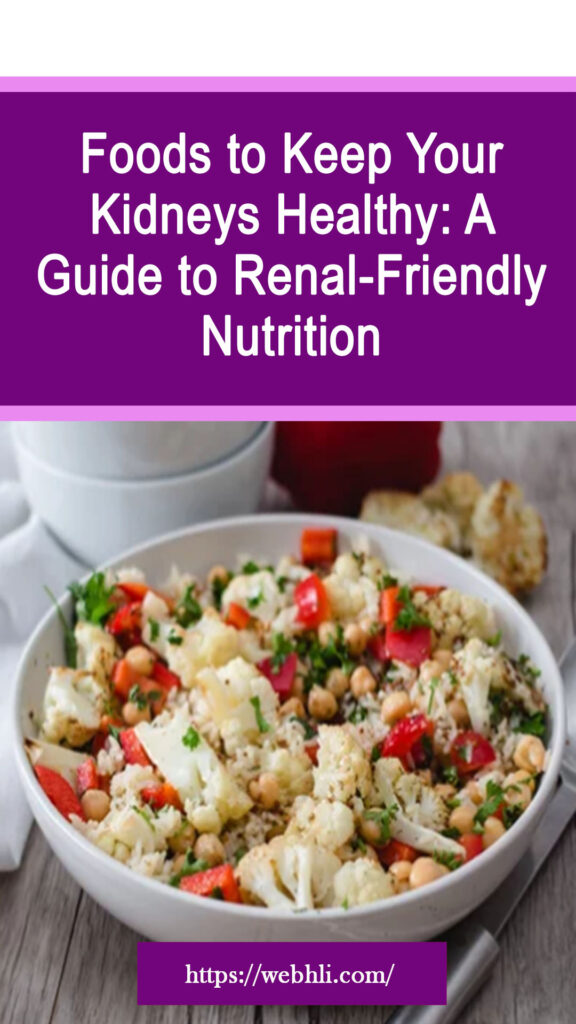
Your kidneys play a vital role in maintaining overall health by filtering waste and excess fluids from the blood, balancing electrolytes, and supporting various bodily functions. To keep your kidneys healthy, it is essential to consume a balanced diet rich in nutrients that support their function. Here is a guide to the best foods to incorporate into your diet for optimal kidney health.
1. Berries
Berries such as blueberries, strawberries, raspberries, and cranberries are packed with antioxidants, vitamins, and fiber. These nutrients help reduce inflammation and oxidative stress, which can protect your kidneys from damage. Cranberries, in particular, are known for their ability to prevent urinary tract infections, which can affect kidney health.
2. Leafy Greens
Leafy greens like spinach, kale, and Swiss chard are rich in vitamins A, C, K, and folate. They also contain magnesium and antioxidants, which support kidney health. However, those with advanced kidney disease may need to limit their intake of potassium-rich greens like spinach and Swiss chard. Opt for lower-potassium options such as kale and arugula.
3. Fish
Fatty fish like salmon, mackerel, and sardines are excellent sources of omega-3 fatty acids. These healthy fats reduce inflammation and lower blood pressure, both of which are beneficial for kidney health. Omega-3s also help reduce the risk of kidney disease progression. Aim to include fish in your diet at least twice a week.
4. Apples
Apples are high in fiber and contain anti-inflammatory compounds. The soluble fiber in apples can help lower cholesterol and control blood sugar levels, which are important for kidney health. Apples are also low in potassium, making them a kidney-friendly fruit.
5. Garlic
Garlic has anti-inflammatory and antioxidant properties, making it a great addition to a kidney-friendly diet. It helps reduce cholesterol and may lower blood pressure. Garlic is also a flavorful alternative to salt, which should be limited in a kidney-friendly diet to prevent hypertension and kidney strain.
6. Cauliflower
Cauliflower is a versatile vegetable that can be used as a low-potassium alternative to potatoes and grains. It is rich in vitamin C, folate, and fiber. Cauliflower also contains compounds that help neutralize toxins in the body, aiding the kidneys in their filtering function.
7. Olive Oil
Olive oil is a healthy fat that contains polyphenols and antioxidants. It has anti-inflammatory properties and can help protect against oxidative damage. Using olive oil as a primary fat source in cooking and salads can benefit kidney health and overall wellness.
8. Red Bell Peppers
Red bell peppers are low in potassium and high in vitamins A, C, and B6, as well as folic acid and fiber. These nutrients support kidney function and overall health. The antioxidants in red bell peppers help combat free radicals, reducing the risk of kidney damage.
9. Onions
Onions are low in potassium and a good source of chromium, a mineral that helps with carbohydrate, fat, and protein metabolism. Onions also contain flavonoids and antioxidants that protect against inflammation and support kidney health. They are a flavorful addition to many dishes and can help reduce the need for added salt.
10. Cabbage
Cabbage is a cruciferous vegetable that is low in potassium and packed with phytochemicals that help break down free radicals. It is high in vitamins K and C, fiber, and folic acid. Cabbage is versatile and can be used in a variety of kidney-friendly recipes, from salads to soups.
Check out these related articles, too:
Common Signs of Kidney Failure
Kidney-Safe Foods- A Guide to Supporting Renal Health
Boosting Kidney Function - Natural and Effective Strategies
Navigating the Dietary Maze Crafting a Unique Plan for Kidney Failure
A brief guide to the control and treatment of diabetic kidney disease (DKD)
Tips for a Kidney-Friendly Diet
- Limit Sodium: High sodium intake can lead to hypertension and fluid retention, which strain the kidneys. Aim to consume less than 2,300 milligrams of sodium per day.
- Control Protein Intake: While protein is essential, too much can overwork the kidneys. Focus on high-quality protein sources and consult with a healthcare provider to determine the right amount for your needs.
- Stay Hydrated: Drinking adequate water helps the kidneys filter waste effectively. However, those with advanced kidney disease should consult their doctor about appropriate fluid intake.
- Monitor Potassium and Phosphorus: Depending on your kidney function, you may need to limit foods high in potassium and phosphorus. Work with a dietitian to manage these nutrients.
Conclusion
Incorporating these kidney-friendly foods into your diet can help maintain and improve kidney health. A balanced diet, rich in antioxidants, vitamins, and minerals, supports the kidneys' vital functions and reduces the risk of kidney disease. Remember to consult with healthcare professionals to tailor your diet to your specific health needs and conditions. With the right nutrition, you can keep your kidneys functioning optimally and enjoy better overall health.

 Protected by Patchstack
Protected by Patchstack